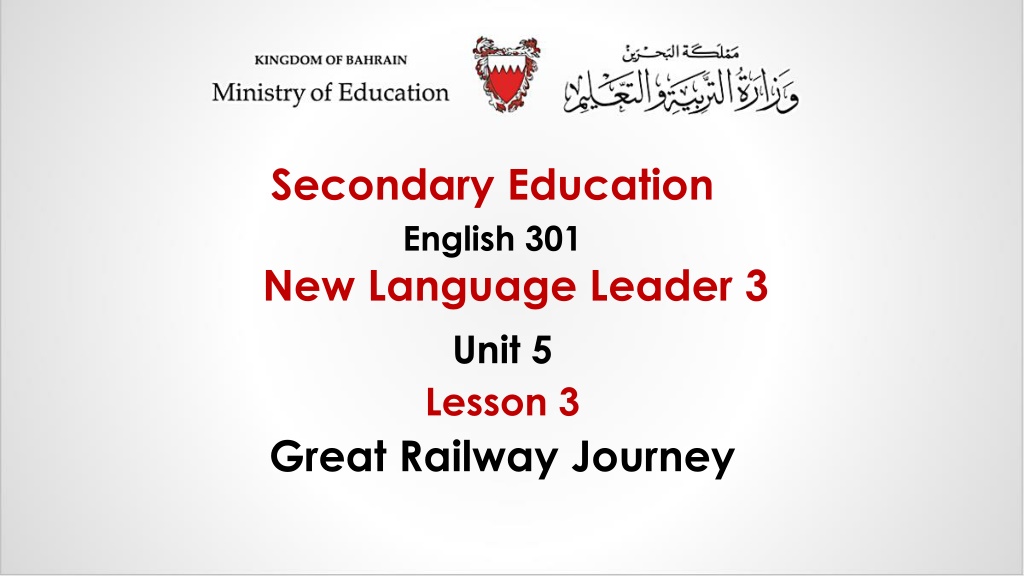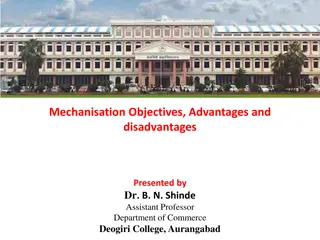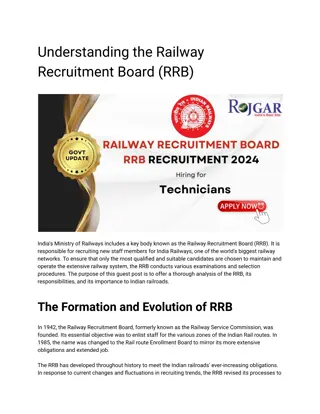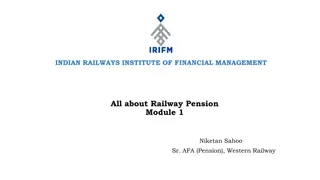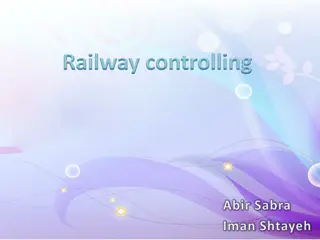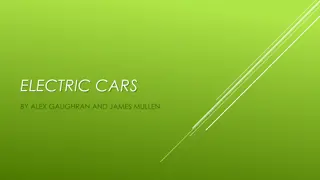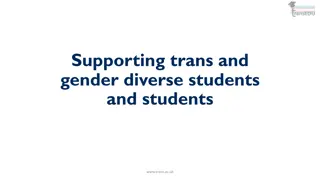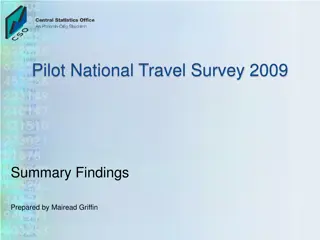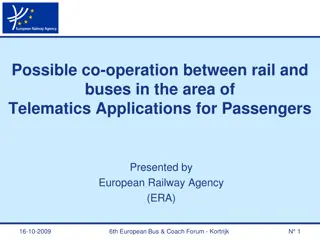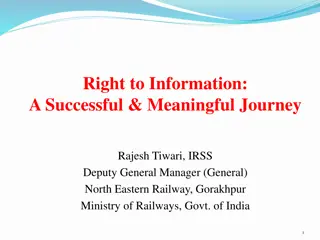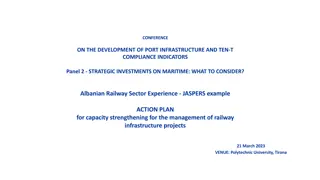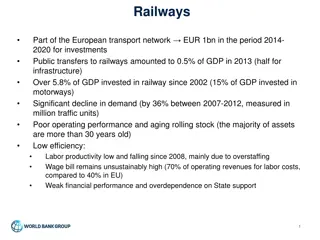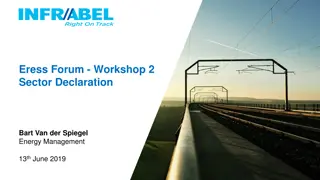Exploring the Great Railway Journeys: Advantages and Disadvantages
Delve into the world of railway transport with a focus on the history of trains, interesting facts, and a discussion on the advantages and disadvantages of train travel. Discover how modal verbs are used in the past tense and practice using them in this engaging lesson.
Download Presentation

Please find below an Image/Link to download the presentation.
The content on the website is provided AS IS for your information and personal use only. It may not be sold, licensed, or shared on other websites without obtaining consent from the author. Download presentation by click this link. If you encounter any issues during the download, it is possible that the publisher has removed the file from their server.
E N D
Presentation Transcript
Secondary Education English 301 New Language Leader 3 Unit 5 Lesson 3 Great Railway Journey
Eng.301 Unit 5 Lesson 3- Great Railway Journeys OBJECTIVES By the end of the lesson, you will be able to: brainstorm ideas about trains and their advantages and disadvantages; extract specific information and language items from a reading text; revise / learn about how modal verbs of ability, possibility and obligation are used in the past and practice using them.
Interesting facts about trains The first railway in Great Britain was made between 1603 and October 1604 as a simple wagonway . Modern railways came in 1800s. American first steam locomotive was imported from England in 1830. Their first American build train was built later during same year. The first travel agency started thanks to a train excursion which was organized in 1841 by the Englishman Thomas Cook. First high-speed trains ware Japan s electric bullet trains running between Tokyo and Osaka in 1964. Today 40% of world s freight cargo is transported via trains, and that number continues to grow each year. Japanese trains are always punctual. If a delay lasts more than 5 minutes, the staff personally apologizes to each passenger. The longest direct train route is found in Moscow. The Trans-Siberian Railway spans into a total length of 9,258 kilometers. The route from Moscow to Vladivostok takes a week at minimum to travel the entire distance. Eng.301 Unit 5 Lesson 3- Great Railway Journeys
Advantages & disadvantages of railway transport Brainstorm some advantages and disadvantages of train travel / railway journeys. Draw a table on your notebook and classify your ideas under the right heading. To get the right ideas, compare the train to other means of transport such as the car, plane etc. advantages disadvantages Eng.301 Unit 5 Lesson 3- Great Railway Journeys
Great. Now classify these phrases or words in the box under the right heading in the table. admiring views lack of flexibility no turbulence slower no assigned seating no traffic jams no rural service dependable safety lack of door to door service price advantage unhygienic public toilets advantages disadvantages admiring views lack of flexibility slower no turbulence no assigned seating no traffic jams dependable no rural service safety lack of door to door service unhygienic public toilets price advantage Eng.301 Unit 5 Lesson 3- Great Railway Journeys
Write down the following questions on your notebook before moving to the reading text on the following slide. 1) Scan the article and find the following: 5) Match the underlined words with their synonyms in the box below. There is one extra word: a. three cities: , .., gigantic supplies flexible beautiful usually b. one water surface: . c. a mountain range: .. a) commonly: 2) What makes the Trans-Siberian Railway Journey unique? b) immense: ______________________________________________________ c) Memories: ______________________________________________________ d) provisions: 3) Which sentence is true? e) scenic: a. Passengers spend all their time alone in private cabins. f) adjustable: b. Passengers generally socialize with other passengers 6) The prefix trans in Trans-Siberian probably 4) The pronoun it in paragraph 2 refers to means .. a) above b) crossing c) beyond 5) Where do Mongolian nomads live? --------------------------------------------------------------------------------------------- Eng.301 Unit 5 Lesson 3- Great Railway Journeys
Now read the article and answer the questions that you read on the previous slide. Once you are done, press the enter key move to the next slide to check your answers. 1. The best way to go from Moscow to Beijing is on the Trans-Siberian Railway, which is the longest railway in the world. The journey is one of the greatest travel adventures. It's the journey that nearly everyone wants to go on, perhaps because it's commonly said to be the longest you can make on a single train. The longest of the three trans-Siberian routes, between Moscow and Vladivostok, covers 9,258km. 2. On this train, you will travel across half of the globe, and pass through eight time zones to reach the furthest edge of one immense country. Your journey will leave you with unique memories and the feeling of experiencing something extraordinary. It will change the way you see time and distance. Days slide by as different passengers meet, have drinks and meals together, and form friendships as the train rolls on, stops for provisions, and takes on new passengers. Outside, you will view the scenic Ural Mountains, the great Siberian plains, the bottomless Lake Baikal, the steppes of the Mongolian nomads, and the easternmost Russian city, Vladivostok, before crossing the border into China. You can stop off at one of the stations, take a tour or stay for a while, and board the train again on another day. Your travel plans can be adjustable, providing you with maximum opportunities for independent discovery. Eng.301 Unit 5 Lesson 3- Great Railway Journeys
Now check your answers 5) Match the underlined words with their synonyms in the box below. There is one extra word: 1) Scan the article and find the following: Beijing a. three cities: , .., Moscow Vladivostok gigantic supplies flexible beautiful usually b. one water surface: . Lake Baikal The Ural Mountains c. a mountain range: . .. usually a) commonly: 2) What makes the Trans-Siberian Railway Journey unique? gigantic b) immense: ______________________________________________________ It is the longest railway in the world. The journey covers 9,258km. X c) memories: ______________________________________________________ passes through eight time zones Travels across half of the globe supplies d) provisions: 3) Which sentence is true? e) scenic: beautiful a. Passengers spend all their time alone in private cabins. flexible f) adjustable: b. Passengers generally socialize with other passengers 6) The prefix trans in Trans-Siberian probably 4) The pronoun it in paragraph 2 refers to means .. journey a) above b) crossing c) beyond 5) Where do Mongolian nomads live? They live in steppes . large areas of land with grass but no trees --------------------------------------------------------------------------------------------- Eng.301 Unit 5 Lesson 3- Great Railway Journeys
Grammar Ability, Possibility and Obligation in the Past PAST ABILITY / POSSIBILITY Could, Was Able To, Managed To OBLIGATION IN THE PAST had to/ didn t have to or couldn t / were allowed to In the past tense, we express general abilities and abilities at specific times in different ways. In the present, the auxiliary verbs must and have to are used to express that doing something is obligatory (You must go), prohibited (You mustn t go), or not necessary (You don t have to go). General abilities These are skills or talents a person once had. In the past tense: use could / was, were able to In high school, she could/ was able to beat anyone in a running race. Specific occasions / single action When we are talking about a specific situation or when noting a specific achievement, we must use was (or) were able to or managed to. We do not use could. We were able to / managed to get a really good price on the car. we can use couldn t, wasn t (or) weren t able to, or didn t manage to to express the same thing inability on a specific occasion in the past. He studied for months but couldn t / didn t manage to / wasn t able to pass the bar exam. In the past, however we use had to / didn t have to or couldn t / were allowed to. Present: I have to / must work late tonight. Past: I had to work late last night. Present: You mustn t tell our secret. Past: You weren t allowed to tell our secret. Present: You don t have to tell me his secret. Past: You didn t have to tell me his secret. Eng.301 Unit 5 Lesson 3- Great Railway Journeys
PRACTICE TIME Put in could / couldn t . If none is possible, use be able to in the correct tense: 1. __________you swim when you were 10? Could 2. We ___________get to the meeting on time yesterday because the train was delayed by one hour. couldn t 3. He ____________arrive at the party on time, even after missing the train, so he was very pleased. was able to 4. I ___________drive a car until I was 34, then I moved to the countryside. couldn t 5. I looked everywhere for my glasses but I ___________find them anywhere. couldn t 6. I searched for your house for ages, luckily I ___________find it in the end. was able to 7. I read the book three times but I _________understand it. couldn t 8. When the car broke down I was really pleased because I ____________solve the problem. was able to 9. I ___________understand the chapter we had to read for homework. It was so difficult. couldn t 10.He _____________cope with the stresses and strains of the job. wasn't able to Eng.301 Unit 5 Lesson 3- Great Railway Journeys
1) Choose the correct word a) - Did you fix the car? - Yes, I managed to /could repair it. b) - Did you do lots of assignments last academic year? - No, we didn t have to / mustn t do many. c) - Were your parents strict when you were a kid? -No, we didn t have to/could do whatever we wanted to do. d) - You didn't have to / couldn t play this silly game. -It s okay. Nobody forced me to play it any way. 2) Complete the second sentence so that it has a similar meaning to the first, using a form of could, able to, have to. a) It wasn t possible to repair your computer.==_______________________ repair your computer. couldn t / wasn t able to b) I had the ability to draw well when I was a child. === I ____________________sing well when I was a child. could / was able to c) It wasn t necessary for John to wear a suit.=== John ________________wear a suit. didn t have to d) It was necessary for me to pay a 25 BD fine. === I ______________ pay a 25 BD fine. had to Eng.301 Unit 5 Lesson 3- Great Railway Journeys
Choose the appropriate alternative in the text. Last week my wife suggested we should have a weekend break in Barcelona, or perhaps Prague. After a few minutes on my computer I (1) was able to / could book flights and a hotel, then print out airline tickets and a hotel voucher all done in less than half an hour. Nothing surprising about that, you might say. But then I suddenly remembered how things were different when I was a child. If my parents wanted to go away they (2) can t / couldn t just use the Internet because there was no Internet. Well, of course it existed, but ordinary people (3)couldn t / weren t able to use it, it was only used by a few universities and some government agencies. Others had to phone a travel agent or drive into town and go to a travel agency. It s the same thing with phones. I remember once, when I was a teenager, going out with some friends and missing the last bus home. Of course, none of us had mobile phones. So we spent hours searching for a phone box so we (4) could / can call for a taxi. Eventually we (5) could / managed to find one, but by then it was 2 a.m. and we were freezing cold. In those days mobile phones were an expensive luxury. Even if you had one, you (6) could only / were only able to use it in big cities because there was no signal in the countryside. And they were huge not much smaller than a house brick. Now I have a phone that s no bigger than a box of matches. And I (7) can / manage to phone anyone, anywhere in the world, any time I feel like it. It can even (8) using / be used to look at the Internet. (9) Do you can / Can you imagine how exciting it was the first time an engineer managed (11) to make /making a phone small enough to put in your pocket? It must have been amazing. But I m sure that in the future they (10) can / will be able to make them small enough to wear as a wristwatch! Eng.301 Unit 5 Lesson 3- Great Railway Journeys
THIS IS THE END OF THE LESSON THANK YOU FOR YOUR ATTENTION AND HARD WORK Eng.301 Unit 5 Lesson 3- Great Railway Journeys
